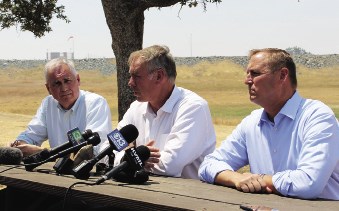
Interior secretary visits reservoirs hit by flows plan

by Kevin Hecteman
7-26-2018
Amid a flood of concern regarding a state proposal to divert more water to the ocean, a Cabinet secretary visited two of the affected reservoirs and a Central Valley congressman offered a pair of amendments aimed at the diversions.
U.S. Interior Secretary Ryan Zinke visited Don Pedro Lake on the Tuolumne River and New Melones Reservoir on the Stanislaus River Friday, in the company of Reps. Jeff Denham, R-Turlock, and Tom McClintock, R-Elk Grove.
"Our goal here today is to show him not only the opportunities we have for more water storage for a growing state, but to also show him the devastation that can happen if you push all of our water out to the ocean," Denham said.
Zinke said he appreciated the opportunity to visit.
"You don't get the same message in D.C. as you do when you go out in the field," Zinke said. "It's incredibly important to actually talk to the districts—meet the water districts face to face."
Zinke said he sees the federal government's job as restoring trust and being a partner in finding a solution.
"When government bureaus can't agree, then it's really difficult for a water district to get a solution," he said. "We as a government have got to begin these (National Environmental Policy Act) processes together."
Zinke said he's looking at reorganizing the department he leads and working to streamline the permitting process, with the objective of "better outcomes in a shorter period of time."
"The federal interest, as the watermaster, is to work with communities, go out and talk to the water districts," he said, "to make sure we're prioritizing the agriculture side of it, the health of the systems. Clearly, in this case, it's been languishing for a long time."
Zinke's department oversees the Bureau of Reclamation, which operates New Melones as part of the Central Valley Project, and the U.S. Fish and Wildlife Service. Don Pedro, operated by the Turlock and Modesto irrigation districts, has been undergoing relicensing of its hydroelectric facility through the Federal Energy Regulatory Commission, a division of the Department of Energy.
Denham said Congress is working with the administration "to have one agency, one decision."
"We should not be seeing our local irrigation districts take 10 years on a relicensing," Denham said, "nor should we see hundreds of millions of dollars that go into study and other changes in our water system that don't help our ratepayers."
TID and MID have been working on relicensing Don Pedro since the fall of 2010, and on relicensing the nearby La Grange powerhouse since 2014. A TID handout listed 36 different studies on the Don Pedro project alone.
"I think the heart of the matter is, you have different bureaus of our government who have different regions, different missions, different biological opinions, different conclusions," Zinke said, "and that's unhelpful.
"In this part of the system, there seems to be enough water," he said. "It's just how to best manage it."
On the day Zinke visited, Denham's office announced that a pair of amendments he offered for an Interior appropriations bill passed the House of Representatives. One would prohibit federal agencies from taking part in the state's plan to take water from New Melones Reservoir; the other would expand financing for water supply projects under the Water Infrastructure Financing and Innovation Act.
The amendments came in reaction to the State Water Resources Control Board's recently proposed update to the Bay-Delta Water Quality Control Plan. The state wants to divert 30 percent to 50 percent of "unimpaired flows" from the Stanislaus, Tuolumne and Merced rivers to the ocean for the intended benefit of fish.
A California Farm Bureau Federation analysis of the plan found that people dependent on these watersheds stand to lose as much as 800,000 acre-feet of water per year (see Comment). Irrigation districts in the watersheds have warned the proposal would have significant impacts on local economies, and have offered alterative solutions that the board has rejected.
CFBF President Jamie Johansson said he was pleased to see the interest by the federal officials.
"It's important to have as many voices as possible telling the state water board that it needs to rethink its proposal," Johansson said.
The House passed its version of the Interior appropriations bill last week. Erin Huston, a CFBF federal policy consultant, said the Senate was expected to take up its version of the bill this week.
Forest management also came into play while Zinke, Denham and McClintock spoke with reporters following their Don Pedro tour. As smoke from the Ferguson Fire near Yosemite turned the sky over Don Pedro hazy, Zinke said he'd signed secretarial orders early in his tenure seeking to expedite the harvest of dead and dying timber.
McClintock said forest management has been lacking.
"Excess timber comes out of the forest one way or another. It's either carried out or it burns out," McClintock said. "When we carried it out, we had healthy forests and we had thriving local economies. Since the permitting labyrinth became so severe that we can no longer actively manage our forests, we've seen an 80 percent decline in timber harvested off of the federal lands, and a concomitant increase in acreage destroyed by catastrophic fire."
Zinke said he believes active management and restored forest health are consistent with the American conservation ethic, "and we are rekindling that ethic."
(Kevin Hecteman is an assistant editor of Ag Alert. He may be reached at khecteman@cfbf.com.)
Permission for use is granted, however, credit must be made to the California Farm Bureau Federation when reprinting this item.
Website Hosting and Design provided by TECK.net